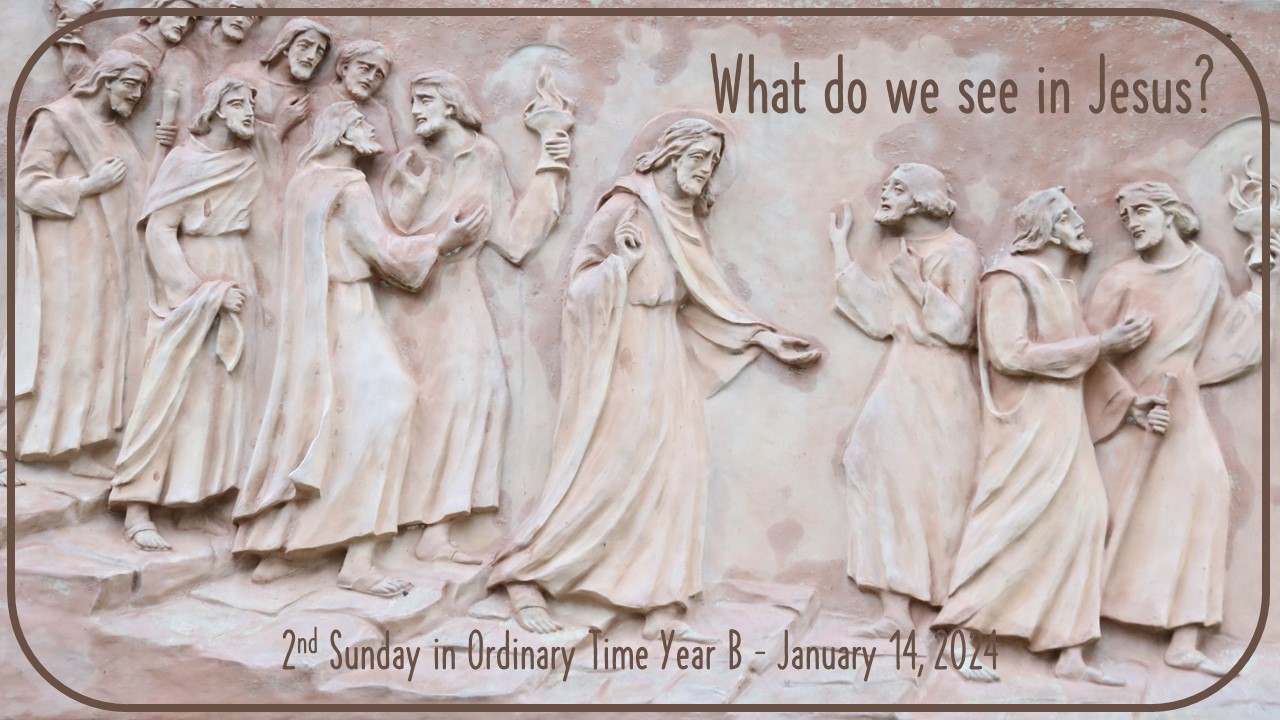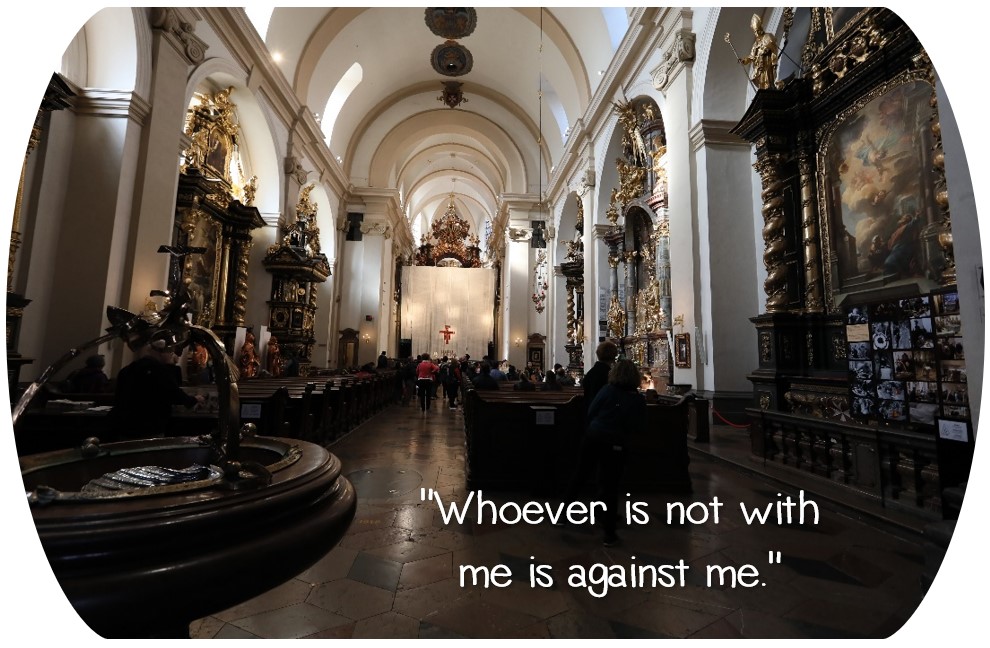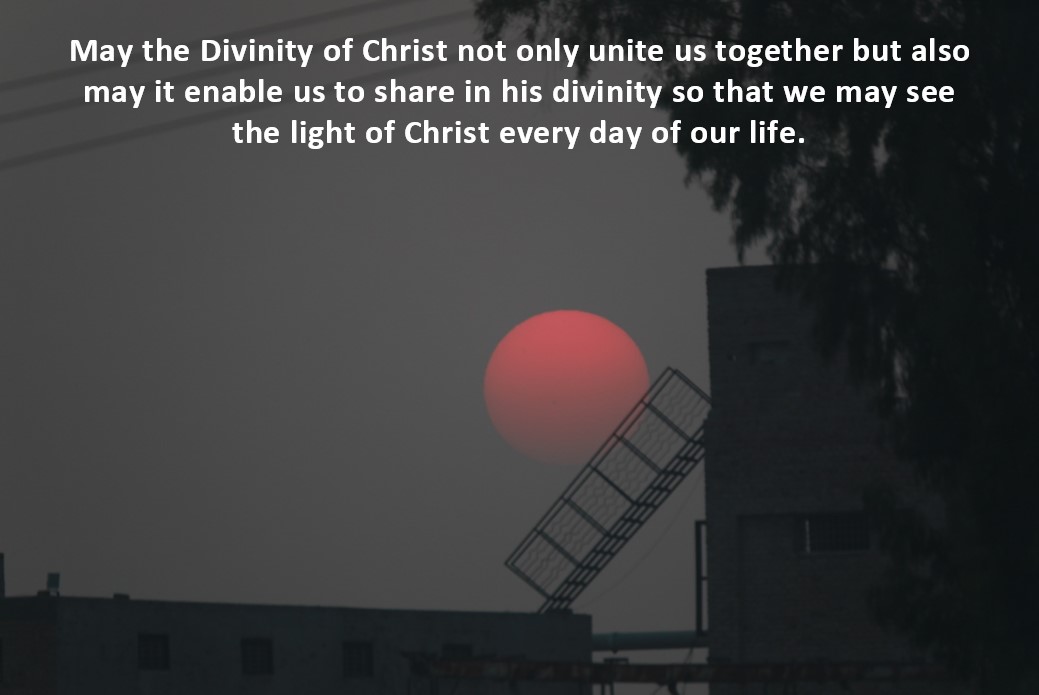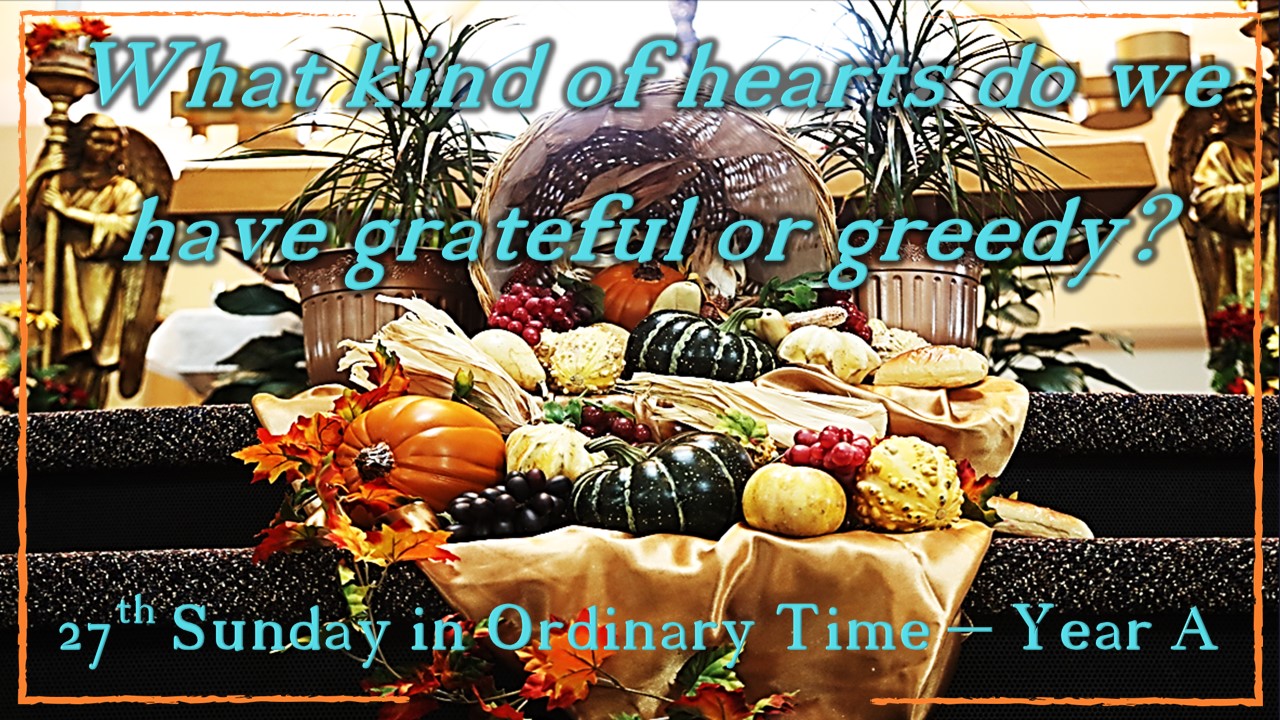
2nd Sunday in Ordinary Time Year B ~ January 14, 2024
WHAT DO WE SEE IN JESUS?
We just completed our Christmas season by reflecting and meditating on the Infancy narratives of our Saviour. Now we have a few weeks in Ordinary Times before we begin our new liturgical season: Lent.
As we begin our season of Ordinary Times, we are invited to reflect on our calling or vocation. Is it easy to follow the Lord? The Lord’s call makes us bearers of a promise and, at the same time, asks of us the courage to take a risk, with him and for him. In the Synoptic Gospels we read the one the requirements of the Lord are “anyone who wants to follow me, let him deny himself and carry his cross and follow me”. The desire to follow Jesus, sometimes makes us to battle with temptations and waves of distractions. Each of us tries to realize his or her deepest desires; we engage in activities that we hope will prove enriching, and we put out on a “sea” of possibilities in the hope of steering the right course, one that will satisfy our thirst for happiness.
Throughout the Sacred Scriptures we read stories of one’s calling to carryout the mission of God. Not everyone was well equipped or qualified but once they accepted the call of God, they became qualified to carry the mission and work of God. (Please read 2 Corinthians 4:1-15).
Once upon a time there a mentally challenged individual that works at a local supermarket. There was a time when the store presented an “Employee of the Month” award to its staff. Every month whoever will be the recipient of that honour, would brag about it and show off the plaque to the store’s customers for a weeks after however that said individual never got the honour.
However, one day a lady met him in the grocery store and asked the young man to help her load some bags into her car. In the conversation that ensued, she asked if he had received a recognition plaque this year. He said, no, and went on to explain that the store had intention to consider him giving one. He became clearly emotional and distraught discussing it. It seemed that it made him feel so sad that his work, which clearly helps him to define himself, will never award him this appreciation. Seeing how much this person cared about this honor, she decided to take it upon herself to do something about it.
So, every year at Christmastime, for the last several years, she gets a recognition plaque made–complete with this man’s name and picture–and awards it to him in the parking lot when he helps her with her groceries. Sometimes, in fact, he is so overcome that someone has taken the time to recognize his work that he often breaks down and cries when she gives him the award.
Holy Father Pope Francis reflecting on the World Day of Vocation says “The Lord’s call is not an intrusion of God in our freedom; it is not a “cage” or a burden to be borne. On the contrary, it is the loving initiative whereby God encounters us and invites us to be part of a great undertaking.
God in fact desires that our lives not become banal and predictable, imprisoned by daily routine, or unresponsive before decisions that could give it meaning. The Lord does not want us to live from day to day, thinking that nothing is worth fighting for, slowly losing our desire to set out on new and exciting paths. He wants us to discover that each of us is called – in a variety of ways – to something grand, and that our lives should not grow entangled in the nets of an ennui that dulls the heart. Every vocation is a summons not to stand on the shore, nets in hand, but to follow Jesus on the path he has marked out for us, for our own happiness and for the good of those around us.
What do we need to understand and realize our call? I believe our eyes and hearts must be focused on the Lord otherwise we will be like these monks: Four monks decided to meditate silently without speaking for two weeks. By nightfall on the first day, the candle began to flicker and then went out. The first monk said, “Oh, no! The candle is out.” The second monk said, “Aren’t we not suppose to talk?” The third monk said, “Why must you two break the silence?” The fourth monk laughed and said, “Ha! I’m the only one who didn’t speak.” Each monk broke the silence for a different reason, each of which is a common stumbling block to meditation. The first monk became distracted by one element of the world (the candle) and so lost sight of the rest. The second monk was more worried about rules than the meditation itself. The third monk let his anger rule over him. And the final monk was lost in his ego.”
In the First Reading we have a very interesting story of a young boy Samuel who is in the temple to serve the Lord. His life teaches three very important lessons. First, we inherit faith from our parents and learn from them how to be obedient. Isn’t it wonderful to see children growing in the likeness of their parents and becoming stronger in their faith after their parents’ example of faith? Secondly, he was very obedient and always ready to serve Eli the priest “Here I am”. Even Jesus as baby remained under his parents and became obedient even to point of death on the Cross as St. Paul writes in the letter to the Philippians. Samuel was all focused on his responsibilities and never let his ego or pride take best of him. Thirdly, he was a listening soul. He was called thrice, and he went running to Eli without bothering about darkness or obstacles on his way to Eli. How do we listen to the Lord without loosing our focus? Responding to the Lord’s call involves putting ourselves on the line and facing a great challenge. We are called to be bold and decisive in seeking God’s plan for our lives. Gazing out at the vast “ocean” of vocation, we must trust instead in the Lord’s promise.
Today’s Gospel on the other hand, shares an interesting story about the first disciples of Jesus. What made these disciples follow Jesus? “Look, here is the Lamb of God!” could be one of the reasons for them to follow. They must have become curious to understand why their teacher is calling Jesus “Lamb of God” whereas they were aware of the sacrificial Lamb in the Law of Moses. Every time during the Holy Mass we repeat these words “Lamb of God who takes away the sins of the world” reminds us that Jesus came to give his life for us sinner to have eternal life. What is our interest to see in Jesus?
Secondly, they want to see Jesus where he is living “where are you staying?” This is the desire we need to have to see where Jesus lives as Psalmist exclaims “As deer long for flowing streams, so my soul longs for you, O God. My soul thirsts for God, for the living God. When shall I come and behold the face of God?” “It is so important to keep this desire alive, this longing to behold the Lord and to experience him, to experience his love, to experience his mercy! If one ceases to thirst for the living God, faith is in danger of becoming a habit, it risks being extinguished, like a fire that is not fed. It risks becoming “rancid”, meaningless” as Pope Francis explains.
What good does it do to meditate on this scene? It reminds us that God did not create us to be alone, closed in on ourselves, but to be able to encounter him and to open ourselves to encounter others. God first comes to each one of us; and this is marvellous! He comes to meet us! In the Bible God always appears as the one who takes the initiative in the encounter with man: it is he who seeks man, and usually he seeks him precisely while man is in the bitter and tragic moment of betraying God and fleeing from him. God does not wait in seeking him: he seeks him out immediately. He is a patient seeker, our Father! He goes before us, and he waits for us always. He never tires of waiting for us, he is never far from us, but he has the patience to wait for the best moment to meet each one of us. And when the encounter happens, it is never rushed, because God wants to remain at length with us to sustain us, to console us, to give us his joy. God hastens to meet us, but he never rushes to leave us. He stays with us. As we long for him and desire him, so he too desires to be with us, that we may belong to him, we are his “belonging”, we are his creatures. He, too, we can say, thirsts for us, to meet us. Our God is thirsty for us. And this is God’s heart. It is so beautiful to hear this. Just remember to the story of Zacchaeus a chief tax collector who was short in stature, physically or maybe morally he was considered by others, had great desire to see Jesus and when Jesus looked up to see him, he was transformed, and a great conversion of heart took place. What kind of conversion or transformation we desire?
Lastly the answer of Jesus in today’s Gospel is ‘words written on the gold tablet’ “Come and See” which is a special call that the Lord addresses to each one of us. The Psalmist says, “it is better to live one day in your house than thousands of years somewhere else”. The response of Jesus opens up to a personal encounter which requires sufficient time to welcome, to know and to acknowledge the other.
St. Jerome once speaking about vocation said, “The Master of the Christian race offers the reward, invites candidates to the course, holds in His hand the prize of virginity, points to the fountain of purity, and cries aloud “If any man thirst, let him come unto me and drink.” “He that is able to receive it, let him receive it.” Let no one think that by this saying “not all man can receive it etc.” either fate or fortune is introduced, for those are virgins to whom it is given by God, or that chance has led to this, but it is given to those who have asked for it, who have desired it, who have worked that they might receive it. For it will be given to the one who asks, the seeker will find, and to the one who knocks it will be opened. … It is in our power, whether we want to be perfect. But whoever wants to be perfect, should sell all that he has…and when he has sold, give everything to the poor.
St. Bernard invites everyone to understand their calling as a promise “The rule of St. Benedict is proposed to every man, imposed on none. It is profitable if devoutly chosen and maintained, but if it is not chosen there is no sin. But what lies in the will of the one who undertakes it, not in the power of him who proposes it, I call voluntary, not necessary. But this which I call voluntary, if someone has one received it of his own will and promised to maintain it thereupon, he himself changes it into a necessity, nor is he free to give up what before he was free not to undertake. And so, what he undertook of his will, he will maintain of necessity, since it is wholly necessary for him to render the vows his lips made, and now by condemned or justified by his mouth. But as one of the saints said, “Happy is the necessity which compels to better things.”
The invitation to those two disciples opens a stream of wisdom to understand that this is not we who have chosen him, but it is he who has chosen us to be with him. St. Francis de Sales says “A true vocation is nothing other than the firm and constant will possessed by the person called, to want to serve God in the manner and in the place where the Divine Majesty calls her. This is the best mark one could have to know when a vocation is true.”
Let me end my reflection with story to examine ourselves and ask ourselves a question “What is my response to Jesus’ response “Come and See”? Is it out of fear or commitment to be with the Lord?
Once a very long time ago there lived a monk, he preferred to spend his time well away from the trappings of society and instead sought seclusion within nature to deepen his meditation practice. He would still visit the local village early each morning to collect his alms food and this had been the way he lived for many years.
One fine afternoon, after he had received his alms food, he found his usual meditation cushion and began to be aware of his breathing and started to practice meditation. His concentration became so great as he sat for a very long time and did not notice the large snake coming closer and closer. He was absorbed with his one-pointed concentration that he had become as still as a tree.
The large snake did not even notice the silent and still monk who was meditating as still as a tree, all he noticed was a nice warm sleeping spot in those monk’s robes all draped around his crossed legs, and in the sunshine, the snake snuggled into the monk’s lap and fell fast asleep.
An hour or so passed like this with the monk in deep mediative concentration and the snake fast asleep on his lap, until slowly the Monk returned his concentration to his surroundings and began to become aware of an unusual weight in his lap. Fear grasped the monk who instantly closed his eyes and started meditating again. He calmed himself and remembered his training, all things are impermanent and forever changing, and knew without a doubt the snake would move on again, and so he stayed in Meditation.
Finally, the snake found himself hungry and uncurled himself from monk’s lap, stretched his biggest stretch and he went off in search of food. The monk also slowly came out of meditation, but something had changed deep within, he had sat for many days in complete absorption of his mind and saw as clear as a mountain lake the processes within himself to understand his calling to follow God. He had attained enlightenment.
We too get enlightenment when we walk with Jesus and see Him because he calls us to see his presence in our lives. This question is for us today to examine our discipleship: What do we see in Jesus?
Other Sermons In This Series

33rd Sunday in Ordinary Time Year C ~ November 13, 2022
November 10, 2022

3rd Sunday in Ordinary Time Year A ~ January 22, 2023
January 20, 2023

27th Sunday in Ordinary Time – Year A ~ October 8, 2023
October 06, 2023

